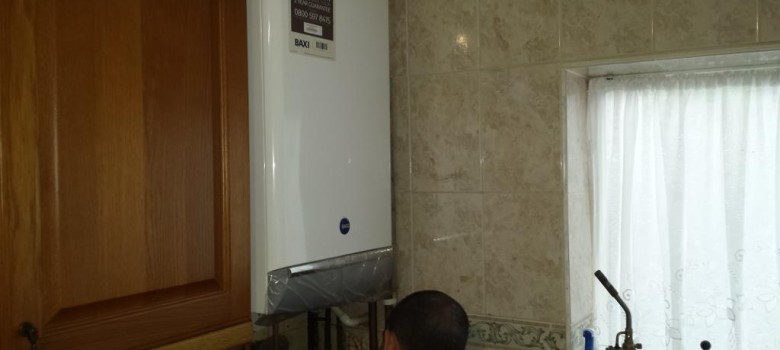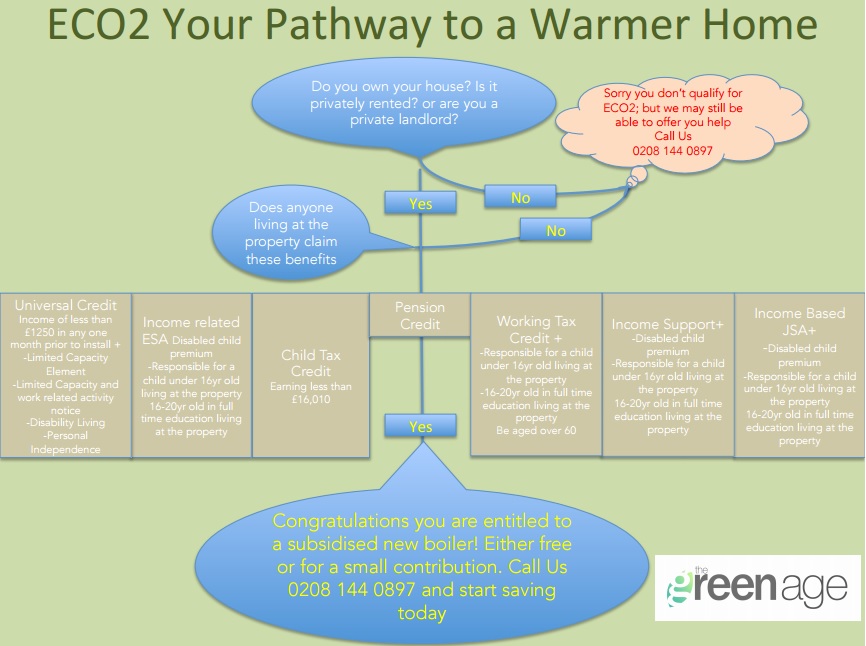
Unfortunately the days of completely free boilers has come and gone. You can however get help towards the cost of installing a new boiler if you meet certain criteria detailed below under a scheme called the Energy Company Obligation (ECO).
The Government is very anxious to help those in energy poverty as well as vulnerable members of society, so have made it a legal requirement that the main energy suppliers (e.g. British Gas) make funds available to cover the cost of these works under the ECO scheme.
Up until about a year ago these funds would have covered the entire cost of installing a new heating system, but now they are looking to make the funds go further, helping more people – so they have reduced the total grant amount available to households meaning that in 99% of cases some contribution from the homeowner will be required.
If you think your home could benefit from a new heating system this year, check out the picture below and see if you meet the eligibility criteria.
HHCRO ECO 2.1 Criteria Diagram
Meet the eligibility criteria, what happens next?
If you meet the eligibility criteria and you live in the Greater London area, then please get in touch and we can help you with the installation process. By getting in touch and talking to us we can advise whether this grant is something you can access and we can do a desktop study over the phone to confirm how to proceed with the next steps.
For just £500+ VAT you can have a brand new condensing boiler installed, with a 5 year warranty for labour and parts. It will put you at piece by having a brand new boiler that you can enjoy without worrying about expensive repairs or it going off during the winter months.
Learn More About How the ECO scheme works!
The market for means tested grants took a hammering in early 2014 when the energy companies fulfilled their required number of installs about 18 months early under the Energy Company Obligation (ECO) scheme. However the good news is that this funding mechanism has reset (as of April 2015) and we are hopeful that this time around we will have a much smoother delivery profile to help those who need it versus the boom and bust we saw when the ECO scheme originally launched during 2013-14.
If you are not aware, the ECO is the funding requirement on behalf of the big energy companies to help vulnerable people and those that live in energy poverty. In addition, it is also in place to help the UK meets its energy saving targets as agreed as part of the Kyoto Agreement.
There are three parts of ECO and the element that is geared towards grants for boilers and heating system upgrades is called the Home Heating Cost Reduction Obligation (HHCRO).
Timings wise – ECO phase 2 has just launched (April 2015) and is due to run until the end of March 2017, covering funding for the remainder of 2015, the whole of 2016 and partially in 2017.
How can you access the HHCRO ECO grant for boilers?
Any Green Deal Provider and/or a PAS2030 boiler installation company can access this ECO grant and can use it help fund some of the cost of the installation.
Therefore if you own your own home or if you are in private “market” rented accommodation and you are on one of the qualifying benefits, then all you have to do is to apply with an approved company who has access to funding and hopefully the process from thereon should be straight forward.
 Can I still get a free boiler under ECO in 2015-2017?
Can I still get a free boiler under ECO in 2015-2017?
The answer is potentially yes, however your property will need to be of the right size and type and level of funding that is offered will need to be generous. The amount of funding the install company will get from a particular job is dependent on the anticipated energy savings that will result after the new boiler gets installed. The company offering this scheme will assess the property for the anticipated savings by carrying out an energy assessment or an EPC. The bigger and more energy inefficient the property, the more funding that can be obtained.
Unfortunately, gone are the days of extremely generous funding where those customers that put their hand up first all got free boilers. The funding has contracted and therefore most customers will be asked to make-up a little contribution towards the cost of a new boiler or heating system.
For example, if a new boiler costs £1,750+ VAT, with ECO funding in place a customer may be asked to pay just £500+ VAT towards the cost of a brand new boiler!
If the existing boiler or heating system comes up as a recommendation, then the company will be able to proceed to the next stage, which is actually accessing the grant.
The feeling is that with ECO phase 2, the industry will want to disassociate itself from the boom and bust years of ECO 1 (2013-2015), and standardise things a bit more when it comes to the offer to the customer.
For example, the installation companies with the funding may just offer a consistent end price to the customer. So they may charge £500 + VAT irrespective of the size of the property to make things really simple. This is also good for the prospective customers because it would potentially give them certainty of the contribution required.
What sort of heating measures are available under ECO 2 in 2015-2017?
Predominantly ECO phase 2 will help fund brand new condensing mains gas boilers, however you will have to have an existing boiler that is not a condensing boiler that qualifies.
If you have an existing condensing gas boiler, then there is funding to help repair it. If the boiler cannot be repaired then then installer will have to certify that is can be decommissioned and recommend a full replacement. Note: this has to be coming from the approved installation company and from a boiler engineer down the street.
Are you eligible for a boiler grant?
What are the qualifying benefits to can allow you the access to the HHCRO ECO 2 grant in 2015-2017?
A: Received one of the following benefits
- Pension Credit
- Child tax credit, relevant annual income below £16,100
Or B: Receive one of the following
- Income-based-job seekers allowance
- Income-related employment and support allowance
+ one of these
- Disabled child premium
- Responsible for a qualifying child under 16 who lives at the property
- Responsible for a qualifying child aged between 16 and 20 in full time education other than higher education who lives at the property
- Pension premium, higher pension premium or enhanced pension premium
- Child tax credit that includes a disability or a severe disability element
- A work related activity or support component (only with Income-related employment and support allowance).
Or C Receive
- Working tax credit with relevant annual income below £16,100
+one of these
- Responsible for a qualifying child under 16 who lives at the property
- Responsible for a qualifying child aged between 16 and 20 in full time education other than higher education who lives at the property
- Receive a disabled worker element or severe disability element
- Be aged 60 or over
Or D Receive:
- Universal Credit – The benefit recipient with an earned monthly take home income of £1,250 or less in any assessment period in the previous 12 months.
+one of these
- The benefit recipient has responsibility for a qualifying young person (a child or disabled child element on the Universal Credit notice)
- A limited capacity for work element on the Universal Credit notice
- Or limited capacity for work and work-related activity element, on the Universal Credit notice
- The benefit recipient is in receipt of disability living allowance
- The benefit recipient is in receipt of personal independence payment
Think we missed something? Do you have a different opinion?
Comment below to get your voice heard…













No Comments yet! Be the first one.